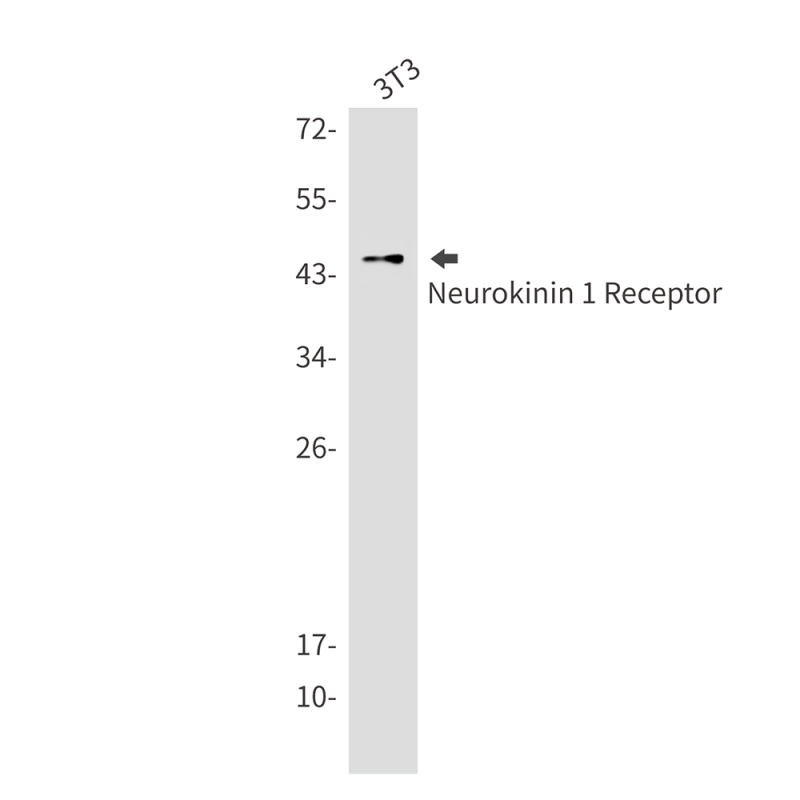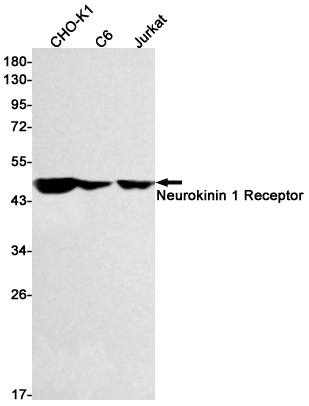

| WB | 1/500-1/1000 | Human,Mouse,Rat,Hamster |
| IF | 1/20 | Human,Mouse,Rat,Hamster |
| IHC | 咨询技术 | Human,Mouse,Rat,Hamster |
| ICC | 技术咨询 | Human,Mouse,Rat,Hamster |
| FCM | 咨询技术 | Human,Mouse,Rat,Hamster |
| Elisa | 咨询技术 | Human,Mouse,Rat,Hamster |
| Aliases | TACR1; NK1R; TAC1R; Substance-P receptor; SPR; NK-1 receptor; NK-1R; Tachykinin receptor 1 |
| Entrez GeneID | 6869 |
| WB Predicted band size | Calculated MW: 46 kDa; Observed MW: 46 kDa |
| Host/Isotype | Rabbit IgG |
| Antibody Type | Primary antibody |
| Storage | Store at 4°C short term. Aliquot and store at -20°C long term. Avoid freeze/thaw cycles. |
| Species Reactivity | Human,Mouse,Rat,Hamster |
| Immunogen | A synthetic peptide of human Neurokinin 1 Receptor |
| Formulation | Purified antibody in TBS with 0.05% sodium azide,0.05%BSA and 50% glycerol. |
+ +
以下是3-4篇关于Neurokinin 1 Receptor(NK1R)抗体的代表性文献概览:
---
1. **文献名称**: *Neurokinin 1 receptor antagonists for chemotherapy-induced nausea and vomiting*
**作者**: Hargreaves, R. et al.
**摘要**: 该文献综述了NK1R抗体及小分子拮抗剂(如阿瑞匹坦)在抑制化疗引起的恶心和呕吐中的作用机制,强调NK1R抗体通过阻断P物质信号通路减少中枢及外周神经系统的呕吐反射。
2. **文献名称**: *Targeting the neurokinin-1 receptor in cancer: current evidence and future perspectives*
**作者**: Mantyh, P. W. et al.
**摘要**: 研究探讨了NK1R抗体在肿瘤微环境中的表达及其与肿瘤生长、转移的关系,动物模型显示阻断NK1R可抑制血管生成并诱导癌细胞凋亡,提示其作为癌症治疗靶点的潜力。
3. **文献名称**: *Characterization of a monoclonal antibody against the neurokinin-1 receptor for immunohistochemical detection in rat brain*
**作者**: Vigna, S. R. et al.
**摘要**: 描述了一种高特异性NK1R单克隆抗体的开发与验证,通过免疫组织化学方法在大鼠脑组织中定位NK1R分布,证实其在丘脑、脑干等区域的密集表达,为神经炎症研究提供工具。
4. **文献名称**: *Neurokinin-1 receptor signaling mediates stress-induced reinstatement of alcohol-seeking behavior*
**作者**: Schank, J. R. et al.
**摘要**: 利用NK1R抗体阻断实验,发现P物质/NK1R通路参与应激诱导的酒精成瘾复发行为,提示NK1R抗体可能作为治疗物质依赖的潜在手段。
---
以上文献涵盖NK1R抗体的治疗应用(如癌症、成瘾)、机制研究及实验工具开发方向。具体文献需通过PubMed或Google Scholar检索标题获取全文。
The neurokinin 1 receptor (NK1R), a G protein-coupled receptor, primarily binds substance P, a neuropeptide involved in pain signaling, inflammation, and emotional regulation. NK1R antibodies are immunological tools designed to detect, quantify, or modulate this receptor in research and clinical contexts. These antibodies are critical for studying NK1R's distribution in tissues, such as the central nervous system, gastrointestinal tract, and immune cells, and its role in physiological processes like emesis, nociception, and stress responses.
Developed using recombinant NK1R protein fragments or cell lines expressing the receptor, these antibodies include monoclonal (high specificity) and polyclonal (broad epitope recognition) types. They enable techniques like immunohistochemistry, Western blotting, and flow cytometry to explore NK1R's involvement in diseases, including chronic pain syndromes, inflammatory disorders, depression, and cancer. NK1R overexpression in certain tumors has linked it to tumor growth and metastasis, making antibodies valuable in oncology research.
Clinically, NK1R antagonists like aprepitant are used to treat chemotherapy-induced nausea, underscoring the receptor's therapeutic relevance. Antibodies against NK1R also serve as tools to validate drug targets or assess receptor modulation in preclinical studies. Challenges remain in ensuring antibody specificity due to structural similarities among neurokinin receptor subtypes. Ongoing research aims to refine antibody design for improved diagnostic and therapeutic applications.
×